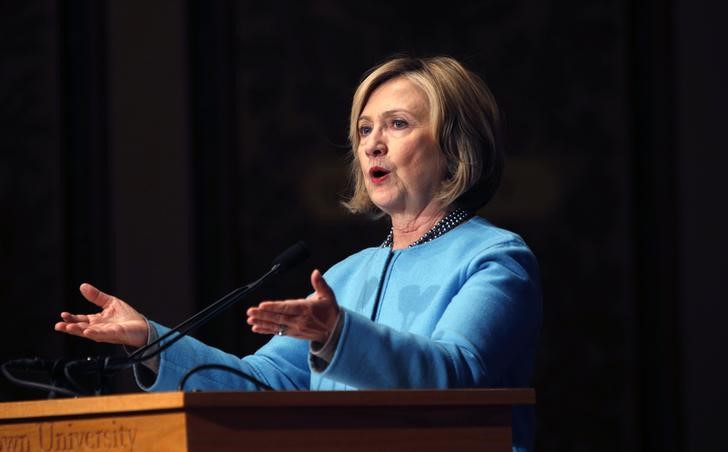By Robin Respaut
SANTA CLARA, Ca. (Reuters) - Hillary Clinton lamented the pay gap between men and women to a crowd of female technology executives on Tuesday, in a speech that showed she may make gender inequality a main theme in her likely 2016 presidential bid.
It was the first of three speeches the former U.S. secretary of state plans to give to predominantly female audiences in the coming weeks, ahead of her presumed but officially undeclared second attempt to run for president. She is the favorite to win the Democratic nomination by a large margin.
With repeated references to breaking "glass ceilings", Clinton noted that less than a quarter of software developers are women, and partly blamed technology companies for fostering a loutish culture.
"It's been almost a Wild West environment," she said of Silicon Valley's boom in recent decades. "I think a lot of women find that distasteful, to be in a situation sort of resembling a locker-room."
She was warmly received by thousands of women and a smattering of men at a convention center in the heart of Silicon Valley, where women commandeered many of the men's bathrooms during the course of the day.
Teams from Oracle Corp (NYSE:ORCL), Ericsson and Intel Corp (NASDAQ:INTC.O) were among those in attendance. They laughed knowingly as Clinton made her practiced non-committal noises about whether she will run.
Although she did not drift from previous positions, it seemed clear she hoped to emphasize her interest in gender inequality.
In her unsuccessful run for the Democratic presidential nomination in 2008, Clinton's campaign tended to downplay her gender and the historic nature of the prospect of a woman being elected president for the first time.
She now appears to have fewer qualms, and has recently relished describing herself as a grandmother.
Next month, Clinton is due to speak at the annual conference of Emily's List, the political action committee that helps to elect women who support abortion rights. Later in March, she addresses the Toner Prize award ceremony, named for the late Robin Toner, the first woman to become a New York Times national political correspondent.
Taking questions after her speech, she criticized the National Security Agency, which a whistleblower revealed was secretly gathering data on millions of Americans, as not transparent enough.

"People felt betrayed," she said. "You didn't tell us you were doing this and now we're reading this on the front page."